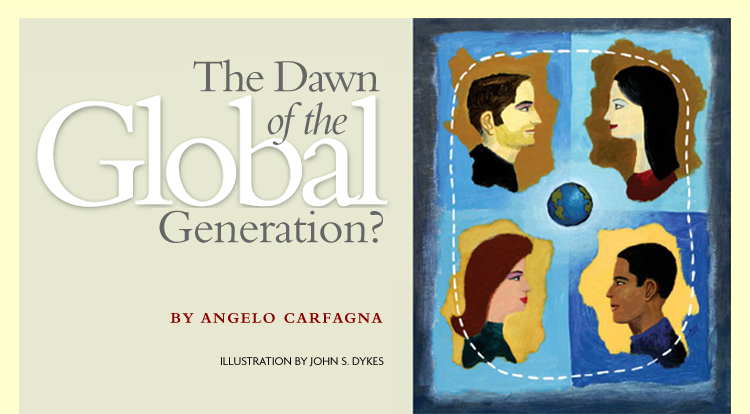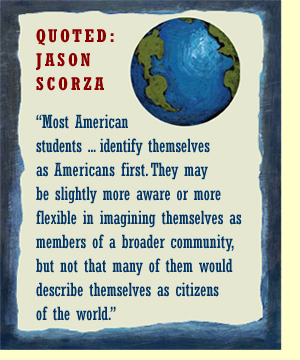

The nation is facing a shortage of nurses, coupled with an increased demand for health care. Find out how FDU is addressing the challenge.
The Campaign for Fairleigh Dickinson University is nearing its $50-million goal.
FDU’s Institute for Forensic Science Administration is applying the principles of economics and business to examine flaws in forensic science.
Ramatu Musa, BA’09 (T), interned at the U.S. Mission to the United Nations in Geneva, Switzerland. FDU Magazine shares her summer travelogue.
Pollster John Zogby has declared America’s youth to be the first global generation. Are they? FDU’s experts comment.Alumni Profile
Clean Power Cells
Gerald DeCuollo,
BS’77 (M)Alumni Profile
Glass Ceiling to Crown Heights
Rosemary Espanol,
BA’70 (M)

The prominent pollster John Zogby recently labeled America’s youth as the “First Globals,” who “bring a consistently global perspective to everything.” He says that today’s 18- to 29-year-olds are “the most outward-looking and accepting generation in American history.”
In his book, The Way We’ll Be: The Zogby Report on the Transformation of the American Dream, the author makes the case that young people are more engaged and more networked with the larger world, more tolerant and appreciative of diversity and more concerned with global issues. •
“More so than any other generation of Americans in history, they see themselves as citizens of the planet, not of any nation in particular.”
He concludes optimistically, “The First Globals are already leading us into a new age of inclusion and authenticity. These are our internationalists, our multilateralists.”
Certainly, as FDU President J. Michael Adams has observed, “Globalization and the advent of the global economy, combined with tools like the Internet, have quickly thrust young people into the global village. From the music they enjoy to the movies they watch, from the products they buy to the information they access, today’s youth are closely linked to the world beyond our borders.”
But does this level of global connectivity represent a truly emerging global consciousness? Are we really seeing a generational transformation? “I’m not sure that being able to look, or even act, beyond borders by itself translates into a real shift of attitudes,” Adams says. “In fact, if global associations are not accompanied by global education, there can be harmful consequences. Still, within this growing global awareness and engagement is the potential for deeper and more significant changes that can in fact produce some forms of global solidarity.”

Samuel Raphalides, professor of political science and history and director of the Metropolitan Campus’ Global Scholars Program, agrees that we are seeing a growing global consciousness, due in major part to technological innovations in communications. Among the implications for colleges and universities, he says, “is a responsibility to provide an environment that intellectually nurtures the energy and curiosity of global consciousness qualitatively through curricula and programs.”
He adds, “In order to truly grasp understandings of the world around us, we as educators should think of those forms of literacy that allow students to appreciate engaging the challenges of the future with competencies needed to help shape it.”
While others also see signs of growing awareness about people and events beyond borders, they’re not ready to herald a global generation yet. Jason Scorza, associate provost for global learning and professor of philosophy and political science, believes Zogby has provided a “rather inflated and exaggerated analysis of young people’s attitudes today.” Although he notes that at FDU, he sees many examples of young global citizens, he adds, “Most American students that I encounter identify themselves as Americans first. They may be slightly more aware or more flexible in imagining themselves as members of a broader community, but not that many of them would describe themselves as citizens of the world.”
Krista Jenkins, assistant professor of political science, and a leading expert on youths and politics, is equally skeptical, concluding that “Zogby is premature in his hopeful assessment.” While she agrees that young people demonstrate attitudes that distinguish them from older citizens relative to diversity and tolerance, she says there’s a difference between attitudes and behavior. “Despite Zogby’s claim that ‘members of this generation are more globally engaged than members of any similar age cohort in American history,’ there have been relatively few instances when youth have participated in large numbers because of their ‘global consciousness.’”
Jenkins adds, however, that regardless of Zogby’s analysis, “it’s obvious that young people today are growing up differently.” She says they are “incredibly diverse” and the “likelihood of relatives in other parts of the world certainly inspires a greater awareness and concern for what goes on beyond our borders.”

She notes, “they’re being socialized in the world of Facebook and MySpace. The ease with which they can learn about and connect with people thousands of miles away would have been unthinkable a mere decade or so ago. One need only recall the death of the young Iranian woman in the aftermath of their presidential election. Neda Soltan’s fateful demise captured the attention of countless people globally and gave events in Iran a human face.”
Finally, she adds, “the attacks on 9/11 made clear that events in other parts of the world are relevant here as well. Inattentiveness to world affairs is likely to leave one ill equipped as an engaged and informed citizen.”
So, if we’re not seeing the advent of a global generation, we’re at least seeing compelling evidence that new technologies and the realities of an interconnected world are altering the perspectives of youth and perhaps slowly broadening their notions of citizenship.
Considering this possibility, FDU’s mission to prepare world citizens through global education takes on special significance, says Adams. “Our students may not all think of themselves as world citizens but they must understand their responsibilities as members of a global community. Their actions can impact others across the globe, and their lives can be shaped by people and events around the world.”
FDU Magazine is published twice yearly by the Office of Communications and Marketing, Fairleigh Dickinson University, 1000 River Road, H-DH3-14, Teaneck, N.J. 07666.
FDU Magazine welcomes your comments. E-mail Rebecca Maxon, editor, at maxon@fdu.edu or make a blog entry at MyFDU.net.
J. Michael Adams, President; Richard Reiss, Senior Vice President for University Advancement; Angelo Carfagna, Assistant Vice President for University Advancement and Communication; Okang McBride, Director of Alumni Relations; Carol Kuzen Black, Director of Publications/Senior Editor; Rebecca Maxon, Editor and Web Designer; Nina Ovryn, Art Director
Contributors: Mary Ann Bautista, Roger Koppl, Andrew McKay, Ramatu Musa, Tom Nugent, Melissa Payton
Photo/Illustration Credits: John S. Dykes, Don Hamerman, istockphotos.com, Shelley Kusnetz, Weaver Lilley, Katharine Marks, Arthur Petrosemolo, Nick Romanenko, Danny Schwartz, Adena Stevens
For a print copy of FDU Magazine, featuring these and other stories, contact Rebecca Maxon, editor, at maxon@fdu.edu.
To update your address e-mail fine@fdu.edu or update your profile online at www.MyFDU.net.
©Copyright 2010 Fairleigh Dickinson University. All rights reserved.



